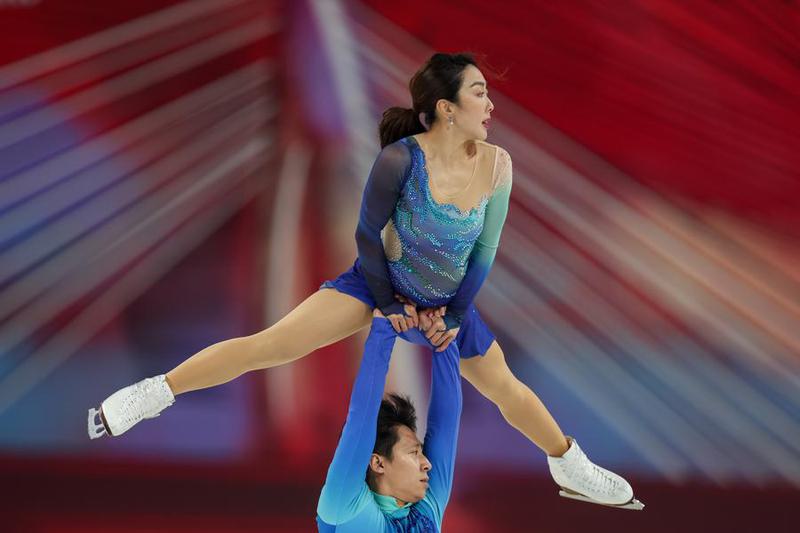
Sui Wenjing (top)/Han Cong of China perform during the pairs free skating at the 2025 Cup of China ISU Grand Prix of Figure Skating in southwest China's Chongqing Municipality, on Oct. 25, 2025. (Xinhua/Huang Wei)
Interview: China’s figure skating Olympic champions Sui, Han return to ice, fueled by duty, passion
Three years after retiring from competitive figure skating, Olympic champions Sui Wenjing and Han Cong made a return at the ISU Grand Prix Cup of China, driven by duty and a shared ambition for China’s pair skating.
by sportswriters Zhang Han, Li Jia and Gu Xun
CHONGQING, Oct. 27 (Xinhua) — When the lights dimmed and music played, a thunderous roar greeted Sui Wenjing and Han Cong in their first competitive appearance since the Beijing 2022 Olympic Winter Games.
At the ISU Grand Prix Cup of China which concluded here on Sunday, three years and eight months after their Olympic win, the duo took bronze, renewing their resolve to help safeguard China’s pair skating legacy.
DUTY CALLS, AND THE ICE BECKONS
Their comeback from retirement comes as China’s pairs have struggled, facing a talent gap and failing to qualify for the 2025 World Championships. Sui, 30, first decided to return, resuming routine training at the end of last year with the goal of competing at Milan-Cortina 2026.
Han, now 33, had announced his withdrawal due to injury in 2023 but ended his hiatus in June to partner Sui and help address the discipline’s crisis, a decision he described as carefully considered.
“It’s a responsibility,” Han, who left his teaching post at Tsinghua University for the return to competition, told Xinhua in an interview on the Grand Prix Gala Exhibition day, which they skipped due to Han’s shoulder injury. “Coming back meant giving up my work and readjusting to competition quickly, which is hard.”
“But the passion, the racing heartbeat on ice, still burns. These chances are rare, so I cherish every moment to challenge myself,” he added.
Sui described her comeback as a deliberate choice rooted in obligation. “I watched Chinese pairs skating struggle during the Milan cycle. As athletes nurtured by the nation, I still have strength to carry the sport forward,” she said, noting initial doubts when Han hesitated. “But standing here today, performing for this crowd, fills me with joy.”
A RACE AGAINST TIME
Returning to elite competition after three years required regaining physical strength, technical precision and their once-seamless synergy.
“Recovery is our biggest fight — every day is a race against time,” Sui said. “Our preparation was tight: a month ago, we could barely do individual moves; now progress is dramatic. But the psychological pressure is huge, and no room for mistakes.”
Han called it “rebuilding from scratch.” “After three years without training, my body’s feel, rhythm and strength changed. I had to rediscover technical elements, even relearn how my body responds,” he said, adding he has lost 10kg since May. “On day one, I injured my arm before warming up, and it’s still not healed. At first, I couldn’t do lifts safely without help. It was humbling, but motivating.”
“Pain is familiar, but time is the real challenge,” Han said, expressing satisfaction with their performance at the Cup of China. “Reaching our current form quickly is a big step. We’re improving, our elements were better here, and progress matches our effort.”
WISER AND MORE REFINED
Their three-year break also brought growth. Han became an ISU Technical Committee official and will run for the IOC Athletes’ Commission at Milan 2026, gaining insight into rule changes.
“Rules evolved, like permitted consecutive double Axels, and we adapted,” he said. “Scoring criteria changes yearly, so we refine moves. Technical difficulty remains key, but we balance it with lightness, leveraging our choreography and artistry for the new system.”
Sui studied at the Beijing Dance Academy during her time off the ice, deepening her understanding of skating aesthetics. “Before, we focused on technical execution. Now, we want our programs to move people,” she said.
Experience has also shifted their mindset. “I still want medals, but expectations don’t always match physical reality,” Han said. “I embrace competition joy. We have top honors, so this comeback is about new challenges and we take it step by step.”
“No athlete skates without wanting gold, but our composure is our strength now. We savor the experience,” Sui said.
AIMING TO SHINE BRIGHT IN MILAN
With China holding one Olympic spot in pairs, Sui and Han must compete with Zhang Jiaxuan and Huang Yihang. Combined results from the Cup of China and this year’s National Championships will determine who goes to Milan 2026.
Sui and Han say the comeback is bigger than personal goals or Olympic selection.
“We want to revitalize the sport,” Han said. “As veterans, we’ll encourage young skaters, support them and guide the sport, so they grow fast and surpass us. That’s legacy.”
“If we make Milan 2026, we’ll inspire Chinese figure skating, letting more see its charm,” he added. “We’ll encourage young athletes to keep climbing, and hopefully we’ll be the bright stars lighting their way.”
Sui said she wants their programs to showcase Chinese culture. “I hope our return energizes pair skating, making the sport stronger,” she said.
Three years after completing a career Grand Slam of the Olympics, World Championships and Grand Prix Final, Sui and Han are chasing the path set by coaches Shen Xue and Zhao Hongbo, who won China’s first Olympic figure skating gold in their 30s, driven by duty and a shared ambition for China’s pair skating. ■








